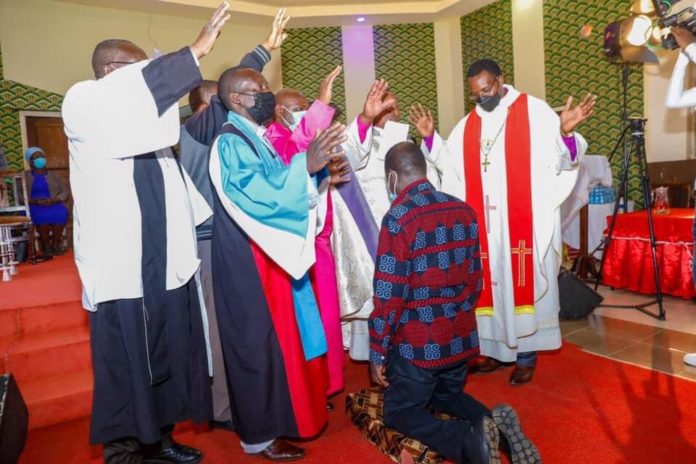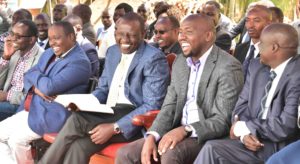
By Isaac Akeyo – National DevReporter

Churches have become inseparable from politics over the years. They command a huge following that attracts many politicians vying for various seats.
A report shows that 70 percent of Kenyans are Christians while 25 percent belong to other religions. This is why political campaigns are always in full swing in various churches across the country.
Churches are expected to be neutral in politics and act as places for dialogue among politicians to maintain peace and unity. They are also expected to serve as good examples to the people by condemning corruption and social injustices in the society.
Archbishop David Gitari preached against political vices
In the 1980s, the Kirinyaga County Councilors were said to have grabbed public land in Kirinyaga. The late Anglican Church of Kenya archbishop David Gitari who was the Bishop in the diocese of Krinyaga at the time, even went further to say that the protected forest hill had been irregularly sold to a government minister from the region.
Gitari called Christians to the bottom of the hill and preached against the actions of the Councilors with the aim of saving the hill.
His sermon was widely broadcast by the media, and it became the key message in the struggle against land grabbers. As a result, the hill was saved from the grabbers. But that was not all, Bishop Gitari also actively participated in other political activism, including the push for political reforms in the 1990s.

Where has the current Church gone wrong?
- Allowing politicians to hijack the pulpit and turning the church into political battlegrounds for attacking their opponents.
- Accepting donations from politicians believed to be corrupt. This has the potential to significantly compromise the integrity of the Church.
- Failing to control politicians uttering inflammatory remarks that could cause animosity among citizens.
- Taking sides in politics, which makes it hard for the Church to strongly condemn injustices in the political space.
What the Church should do to solve the issues?
- Just like the World Council of Churches joined other institutions in condemning former US President Trump’s negative remarks on other countries in 2018, the Church in Kenya should follow suit and act against politicians uttering inflammatory remarks that could cause hostility among the people.
- All denominations in the country should join hands in banning politicians from church pulpits to avoid political attacks in places of worship.
- The Church should also work together with anti-corruption agencies to weed out corruption in places of worship and society in general.
- The Church can also use biblical sermons as one approach to fighting corruption and injustices in the society. Bishop Gitari tried it in the 1990s and it worked.
The Church in Kenya has been faulted for being compromised. In February this year during a special meeting with Mt. Kenya leaders at Sagana in Nyeri County, President Uhuru Kenyatta condemned church leaders he claimed were compromised by huge donations from corrupt politicians.
However, through the Church and Clergy Association of Kenya (CCAK), the Church leaders distanced themselves from the President’s claims and asked him to respect the church.
Though the Church has been faulted for being compromised and sleeping on their roles in the political space, others feel that politicians and citizens also have a significant role to play to reform the country’s political space.





